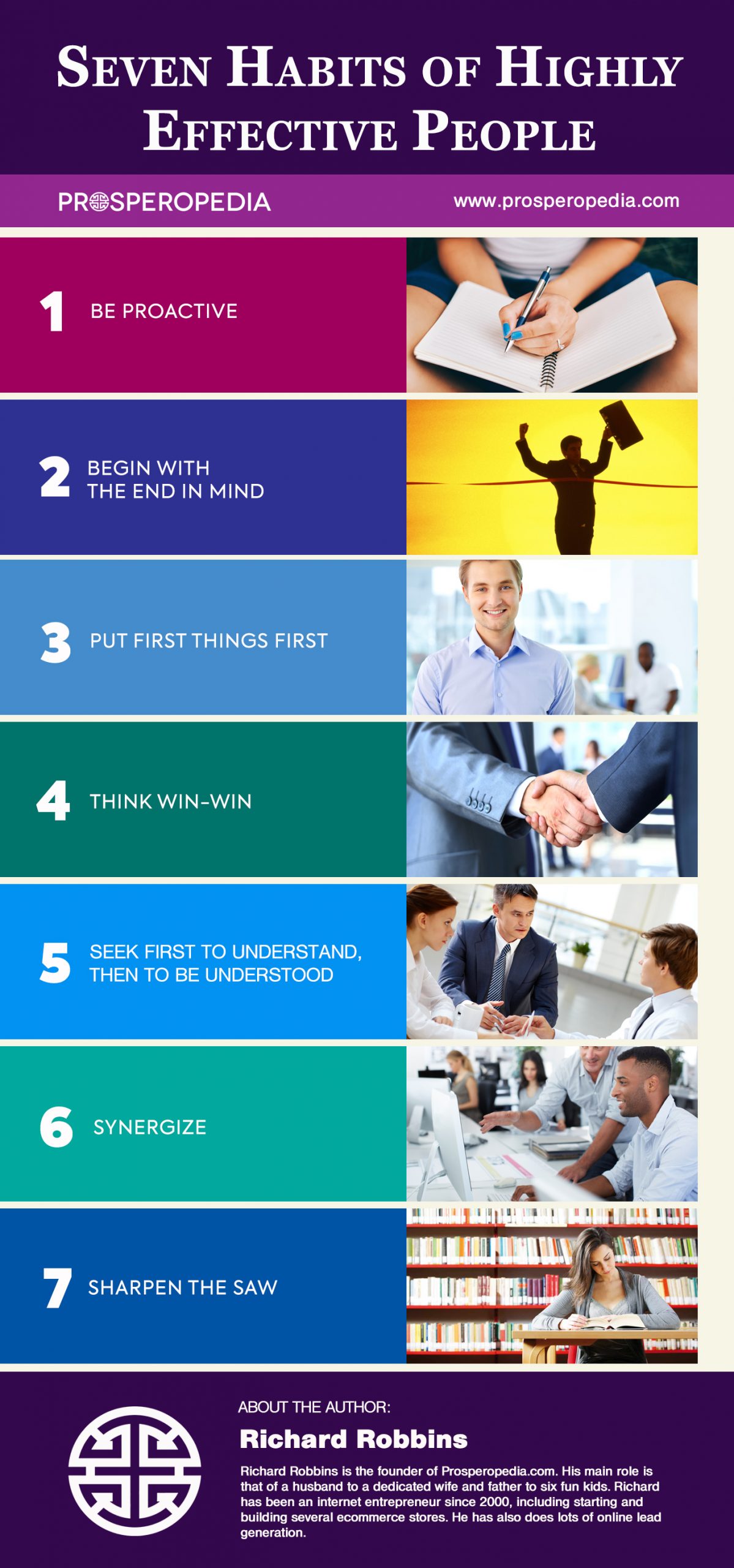Seven Habits of Highly Effective People: A Summary
The approach to self-improvement described in The 7 Habits of Effective People book by Stephen Covey, originally published in 1989, has become one of the most popular methods for becoming, as the book implies, effective. In 2004, Covey added an 8th habit to his popular improvement methodology.
Stephen Covey, a religious, family-oriented man who was a devout member of the LDS Church, essentially created the 7 Habits by taking his religious values an applying them to the secular world so that they could be consumed by a broad audience, regardless of religious background and belief. The approach to productivity described in Covey’s 7 Habits program has been used extensively for corporate training, in leadership seminars, an in career development programs.
Here is a list of all eight habits with a summary of how each habit can be developed along with a description of how that habit is beneficial for self-improvement.
Habit #1:Be Proactive
This habit involves recognizing that there are things that can’t be changed, but that there are things that can be changed. The habit of being proactive leads a person to focus on what things can be changed, intentionally improved.
Developing the habit of being proactive means avoiding being passive and reactive. The power to choose, to create, to act as an intelligent being instead of simply being acted upon like a victim is a critical part of understanding the habit of being proactive.
Habit #2: Begin With The End In Mind
This habit helps a person see his own future and create it virtually or spiritually previous to it becoming reality. The habit of beginning with the end in mind leads a person to envision what his life should be like or how to create a particular scenario, which then creates a pathway to making that hope a reality.
Habit #3: Put First Things First
This habit, Put First Things First, is concerned with organizing how you spend your time and energy. This habit creates 4 different categories of priorities:
- Important/Urgent
- Important/Not Urgent
- Not Important/Urgent
- Not Important/Not Urgent
Developing the habit of putting first things first results in spending a good portion of your time in Quadrant 2, where the activities you’re involved in are all important, but have not been put off to the point where they have become urgent. Quadrant 1 is the next best
Mastering habit #3 brings satisfaction, productivity, and fulfillment into a person’s life and his or her time is filled with activities of importance without undue stress.
To make this habit work, a person must consciously determine what things are important, and which things are not. Determining what things are important should be done in consideration of a thought out personal mission.
4: Think Win-Win
This habit addresses interactions people have with each other. Pursuing a win-win outcome increases one’s ability to collaborate with others in such a way that each party is benefitted.
Thinking win-win is superior to other approaches to making deals and arrangements, including win-lose or lose-lose. A person who thinks win-win realizes that, even when compromise is necessary, it should be the goal of a highly effective person to bolster those with whom he interacts.
 Habit #5: Seek first to understand, then to be understood
Habit #5: Seek first to understand, then to be understood
This habit is a parallel to the Golden Rule: do unto others as you would have others do unto you.
Developing this habit leads a person to be empathetic, to listen and try to understand the viewpoint of others. When a person exhibits this habit, relationships tend toward harmony and problem solving rather than contention and conflict.
The habit of seeking first to understand, then be understood has a parallel in Greek philosophy, where the sequence of the concepts of ethos (personal credibility) -> pathos (empathy) -> logos (logic) leads to mutually beneficial outcomes and productivity.
Habit #6: Synergize
Developing this habit involved teamwork. When you recognize that your efforts can be magnified when combined with the talents, efforts, and energy of others, miraculous things can happen.
The concept of synergy is often illustrated using the strands of a rope, which individually are weak, but when combined together become a powerful tool.
Habit #7: Sharpen the Saw
This habit involves renewing yourself physically, mentally, and spiritually. Physical renewal comes from things like exercise, nutrition, and other healthy habits. Mental renewal comes from reading and other sources of education. Spiritual renewal comes from prayer, meditation, and paying attention to your inner self.
The habit of sharpening the saw allows your body and soul to work together effectively.

Habit #8: Find your voice and inspire others to find theirs
This habit was added many years after the original set of 7 Habits of Highly Effective People book was published. This habit was described in a book released by Stephen Covey in 2004. The 8th habit reinforces the concept of interdependence and segues discovering your own personal value and unique persona into the need to show others how to find their own. This habit leads a person to be seek for the highest possible fulfillment in mankind, including oneself.













